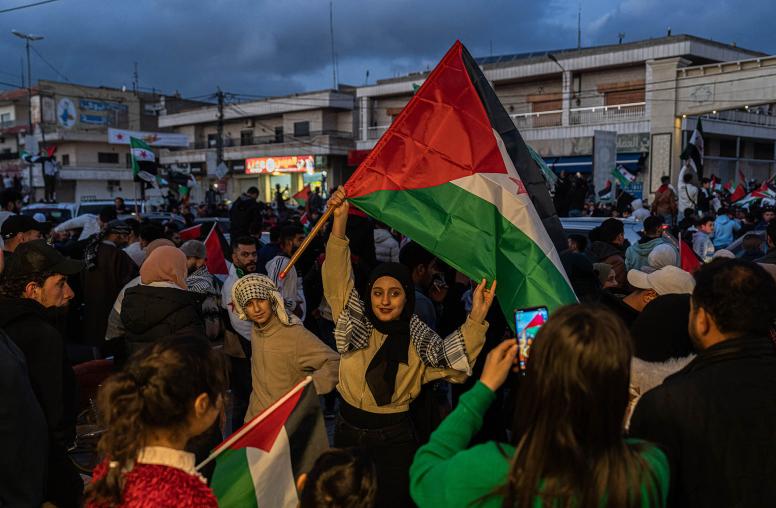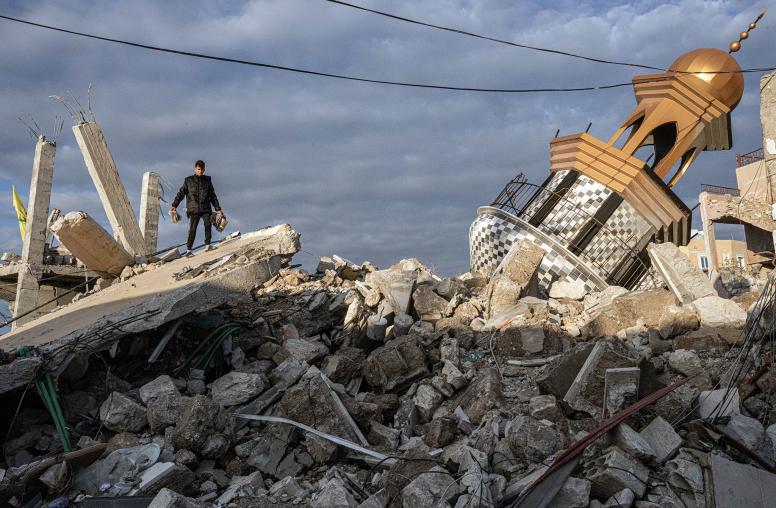Lebanon's Confessionalism: Problems and Prospects
Over the past year and a half, Lebanon has witnessed tremendous political upheaval. Can Lebanon escape its sectarian politics and offer itself as an example for the region?
Over the past year and a half, Lebanon has witnessed tremendous political upheaval. In September 2004, Parliament extended the term of the country's president, Emile Lahoud, for three years after heavy-handed Syrian interference. Attempts were made on the lives of several public figures; among those killed was former Prime Minister Rafik Hariri. A popular uprising forced Syria to withdraw the troops it had deployed in Lebanon since 1976. New parliamentary elections were held in May and June, 2005, and resulted in a new majority coalition of reform-minded, albeit sectarian, leaders who promised an overhaul of Lebanese politics.
Despite their promises, the country remains mired in political inertia and suffers from a seeming inability to institute deeply needed reforms in its political structure and governing arrangement.
Confessionalism at a Glance
In political science terminology, confessionalism is a system of government that proportionally allocates political power among a country's communities—whether religious or ethnic—according to their percentage of the population. It derives from another more academic term called consociationalism that, in essence, has four elements:
- Proportional allocation of political posts among communities according to their numerical representation in the population;
- A grand coalition between communities' leaders on common policies that serve all;
- Communal autonomy whereby each community is free to determine its own affairs such as personal status laws; and
- Mutual veto power, so that any decisions deemed detrimental by any community can be voted down.
At the time of Lebanon's independence from France in 1943, the National Pact, a gentlemen's agreement between the country's Maronite Christian President Bishara al-Khouri and his Sunni Muslim Prime Minister Riyadh al-Solh, consecrated this confessional formula. Religious communities were allocated specific political posts. Thus, it was agreed that the President of the Republic was to be a Maronite Christian, the Prime Minister a Sunni Muslim, and the Speaker of Parliament a Shia Muslim. Other lower political posts were also assigned according to this formula. Representation in parliament was set according to a ratio of 6:5 in favor of the Christians. The Taif Agreement of 1989, which officially ended the long-running civil war, reasserted the confessional formula but changed parliamentary representation to a 50:50 Christian/Muslim ratio.
While the original confessional formula was good for civic peace and gradual democratic development, it created other problems. Having all kinds of religious communities meant an eventual extension of regional politics into domestic affairs. While the Muslims in general wanted close relations with their Arab, mostly Muslim, neighbors, the Christians wanted to maintain close relations with the West despite their Arab identity.
For a while, allowing its communities to have mutual veto powers helped make the country an open and tolerant society. Today's troubles stem from the interaction between this formula and the regional dynamics. While the country worked hard to maintain its civic peace and democracy, regional considerations are drawing it into unwanted territory.
In an effort to shed more light on how this tension might be resolved, USIP convened a panel of Lebanese experts to discuss whether Lebanon can escape its sectarian politics and whether it can offer itself as an example for the region. The panelists included Hassan Mneimneh, columnist for the Arabic-language al-Hayat newspaper and director of the Iraq Memory Foundation; Marwan Kraidy, professor at American University and fellow at the Woodrow Wilson Center for Scholars; and Hisham Melhem, Washington bureau chief of the Lebanese an-Nahar newspaper and senior analyst for the al-Arabiya television network.
Confessionalism and Prospects for Lebanon
Choosing the Arabic word taifiyya to identify Lebanese sectarianism, Mneimneh framed his remarks in terms of three overarching propositions:
- Taifiyya in Lebanon is not an accident of history, and the National Pact of 1943 did not lead to the sectarian politics we see today. The communal political arrangement is a long-standing manifestation of the country's indigenous politics. The Ottoman Empire that ruled the eastern Mediterranean since the sixteenth century codified the practice using Islamic law, but it had been in place since the thirteenth century. This system of governance incorporated the elements that remain in place today: a limited conception of the role of the state; the allocation of legislative functions to non-state institutions; and the dominance of politics by a certain community—in this case to the Muslim Sunnis. The state as a legal entity was never designed to interfere in communitarian politics.
- A 'dissonance' has developed between the traditional model of governance and the concept of the secular state as it has evolved in the twentieth century. On the one hand, communitarian leaders would like to consolidate a vertical integration of their communities, thereby preserving their own communal influence. On the other hand, the horizontal interests (economic, institutional, and social) engendered by modernity and the role of the secular state call for an integration of the confessional communities. Thus, a clash has developed between two different sets of interests. Such a clash is exploited—and thereby made more acute—by regional actors, be they Israel, Syria, the Palestinians, or the Americans.
- There are strong indications that the relationship between the individual and the state has become more important than before. In fact, hope for a new, peaceful Lebanon lies in horizontal integration between communities and more dynamic state-society relations.
Mneimneh lauded the success of municipal elections, where integration is more horizontal than vertical, and called for the creation of a bicameral legislature where legislation would be vested in a lower house while an upper house or Senate can represent communal interests. Mneimneh concluded on an optimistic note, saying that Lebanon's prospects are quite good.
The Role of Lebanese Media
Kraidy began his presentation by proposing that
- the media plays an important role in shaping identities,
- the media offers competing visions of Lebanon, and
- the media has a political weight even as they are used to manipulate public opinion. His remarks concentrated on the sector during the 1975-1990 civil war when about fifty television and 150 radio stations crowded the spectrum and later forced an audio-visual Media Law and licensing regulations.
While all of Lebanon's TV stations have agreed-upon and known confessional identities, they try to act as if they are pan-Lebanese. On occasion, when there are certain political emergencies or other crises, their coverage seems to become increasingly confessional. (Kraidy calls this "drive-by confessionalism.") On the other hand, there is a clear business bent, allowing for market considerations such as when the 'Christian' Lebanese Broadcasting Corporation airs Ramadan programming.
During the 2005 parliamentary elections, television coverage was not entirely confessionally based. For example, the maverick Christian politician Michel Aoun received favorable coverage on New TV, established by the Communist Party with assistance from a Sunni billionaire at odds with the late Prime Minister Rafik Hariri. Meanwhile, Hariri's own Future television gave very favorable coverage to Samir Geagea, a former nemesis of all non-Christian communities during the civil war.
As for coverage during the social and political upheaval in the spring of 2005 (the "Cedar Revolution"), Kraidy stated that it was more personalized than confessional. There was a new spirit of hope in the air following popular mobilization against the Syrian presence in the country. Media coverage of the riots in early February that resulted in the burning of the Danish consulate in Beirut was almost entirely political, with LBC and Future TV concentrating on the fact that many of those arrested were Syrian while New TV and others emphasizing other mitigating circumstances.
Kraidy ended his presentation with two interesting comments about what might be in store for a new media look. The first was that the majority of Lebanese are fed up with confessional politics and thus are watching non-confessionally identified stations. The second is that media outlets, no matter their identification, are beginning to act more and more as a cohesive, corporate entity in defense of their right to free speech.
Implications for the Region
In contrast to the two previous speakers, Melhem argued that Lebanese confessionalism is nothing less than "a cancer on the country's body politic." He discouraged talk of applying it elsewhere in the region, as is now being attempted in postwar Iraq. He stated that while Lebanon has always had democratic politics and practices, it has never really had full democracy. Its sectarian politics allows interference from outside actors, specifically Iran, Israel, Syria, and the United States. He cited the Spanish civil war of the 1930s as an example of interference when European countries, and even the United States, fought proxy wars against each other and against fascism. In a sharp critique, Melhem blamed the Lebanese for inviting outsiders to interfere and settle scores on Lebanese soil.
Taking a historical look at the region, Melhem pointedly criticized Arab regimes as sectarian, despite their claims to the contrary. He singled out Baathist Iraq and Syria as two confessionally based regimes. The former was even Tikriti-based and Saddamist at its core, he said, while the latter is Alawi-based and concentrated on the Assad family. He criticized American policy in Iraq as exacerbating an already existing confessionally based society and called for a more equitable distribution of political power with a special emphasis on diversity. While allowing the Shi`aa of Iraq to enjoy the political power they were deprived of under the Ba`ath regime, Melhem cautioned against monopolizing it.
Reminding the audience of the liberal era between the two world wars in the Arab world, Melhem called for a more open and secular political arrangement. Political parties and associations flourished during the liberal period and everyone had a chance of thinking and acting within the parameters of nationhood, and not simply according to their sectarian identities. If democracy is to find a foothold and succeed, an emphasis on secular principles must be encouraged. Confessionalism, as it has been applied in Lebanon and as it is being advocated for in Iraq, is the wrong formula for sustainable and peaceful democratic development.
About the Author
This USIPeace Briefing was written by Imad Harb, senior program officer in the Education program at the United States Institute of Peace. The views expressed here are not necessarily those of USIP, which does not advocate specific policies.
The United States Institute of Peace is an independent, nonpartisan institution established and funded by Congress. Its goals are to help prevent and resolve violent international conflicts, promote post-conflict stability and development, and increase conflict management capacity, tools, and intellectual capital worldwide. The Institute does this by empowering others with knowledge, skills, and resources, as well as by directly engaging in peacebuilding efforts around the globe.



